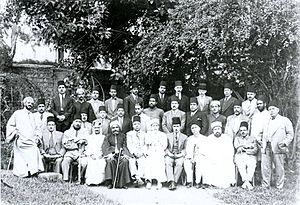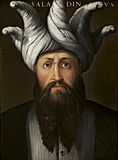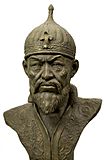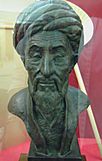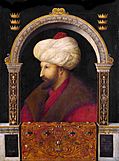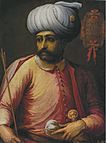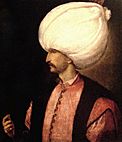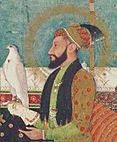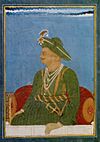Mujaddid facts for kids
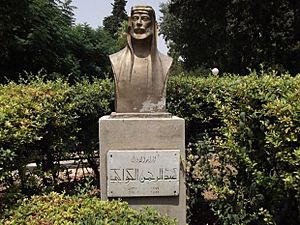
A Mujaddid (Arabic: مجدد) in Islam is like a special reformer. Their job is to fix mistakes that have happened among Muslims. They help people understand important religious truths. Many Muslims believe a Mujaddid appears at the start of every new century in the Islamic calendar. Their goal is to bring Islam back to its original, pure form. Today, a Mujaddid is often seen as the most important Muslim of their century.
Some experts on hadith (sayings of Prophet Muhammad) have different ideas. Scholars like Al-Dhahabi and Ibn Hajar al-Asqalani think that "Mujaddid" can also mean a group of people, not just one person.
The Arabic word mujaddid means "reformer" or "renewer." It describes someone who brings new life and change to the religion. The idea of tajdid (renewal) and the term mujaddid come from a hadith. This is a saying of the Prophet Muhammad. It was written down by Abu Dawud in his Sunan, which is an important collection of the Prophet's sayings for Sunni Muslims. In this hadith, the Prophet Muhammad says:
"Allah will raise for this community at the end of every hundred years the one who will renovate its religion for it."
Mujaddids can be important scholars, fair rulers, or even military leaders.
What is Tajdid in Islam?
Tajdid (renewal) in Islamic thought means making Islamic ideas fresh again. This includes new ways of thinking in science and knowledge. It also means finding new ways to understand and explain Islamic rules.
Al-Suyuti, a scholar, explained that renewing religion means making its guidance clear again. It means showing its truth and importance. It also means correcting new ideas or extreme views that might appear. It helps people follow Islam's rules to manage society and daily life.
Some of the main ways tajdid (renewal) happens in Islamic thought include renewing Islamic sciences. These sciences are:
- The study of Islamic beliefs.
- The rules for understanding Islamic law.
- The study of Islamic law itself.
- The study of the Prophet's traditions (Sunnah).
- The study of explaining the Qur'an (tafsir).
- The study of inner purity and good behavior (Sufism).
- The life story of the Prophet and Islamic history.
Important Reformers in Islam
There is no official way to choose a Mujaddid. The people on this list are believed by many to be Mujaddids.

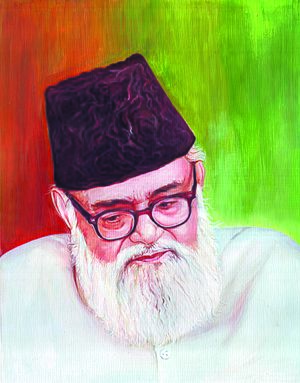
In Sunni Islam, there is no formal way to name a mujaddid. However, people often agree on who they are. The Shia and Ahmadiyya groups have their own lists of Mujaddids.
First Century (after the Prophet)
- Umar ibn Abd al-Aziz (682–720)
Second Century
- Muhammad ibn Idris ash-Shafi`i (767–820)
- Ahmad ibn Hanbal (780-855)
Third Century
- Muhammad al-Bukhari (810–870)
- Abu al-Hasan al-Ash'ari (874–936)
Fourth Century
- Abu Bakr Al-Baqillani (950–1013)
- Hakim al-Nishaburi (933–1012)
Fifth Century
- Ibn Hazm (994–1064)
- Abu Hamid al-Ghazali (1058–1111)
Sixth Century
- Salauddin Ayyubi (1137–1193)
- Fakhr al-Din al-Razi (1149–1210)
- Muhammad bin Bakhtiyar Khalji (1206)
Seventh Century
- Ibn Taymiyyah (1263–1328)
Eighth Century
- Ibn Qayyim al-Jawziyya (1292–1350)
- Tamerlane (Timur) (1336–1405)
- Ibn Hajar al-Asqalani (1372–1448)
Ninth Century
- Jalaludin Al-Suyuti (1445–1505)
- Shah Rukh (1377-1447)
- Mehmet II (1432-1481)
Tenth Century
- Selim I (1470-1520)
- Suleiman the Magnificent (1494-1566)
- Ahmad Sirhindi (1564–1624)
- Abdullah ibn Alawi al-Haddad (1634–1720)
Eleventh Century
- Mulla Sadra Shirazi (1571–1640)
- Khayr al-Din al-Ramli (1585–1671)
- Mahiuddin Aurangzeb Alamgir (1618-1707)
Twelfth Century
- Shah Waliullah Dehlawi (1703–1762)
- Muhammad ibn Abd al-Wahhab (1703–1792)
- Murtaḍá al-Zabīdī (1732–1790)
- Shah Abdul Aziz Delhwi (1745–1823)
- Usman Dan Fodio (1754–1817)
- Tipu Sultan (1750–1799)
Thirteenth Century
- Muhammad Abduh (1849–1905)
- Said Nursî (1878–1960)
- Syed Ahmad Khan (1817–1898)
- Mirza Ghulam of Qadian (1835–1908) (according to the Ahmadiyya movement only)
Fourteenth Century
- Abul A'la Maududi (1903-1979)
- Muhammad Nasiruddin al-Albani (1914-1999)
Images for kids
-
Dr. Abdel-Halim Mahmoud with Jimmy Carter & Egyptian ambassador Ashraf Ghorbal in USA.
-
Prof. Lakshman Madurasinghe with Ahmed Deedat at a discussion on issues between Christianity and Islam at Abu Dhabi Continental in 1987.
 | John T. Biggers |
 | Thomas Blackshear |
 | Mark Bradford |
 | Beverly Buchanan |


